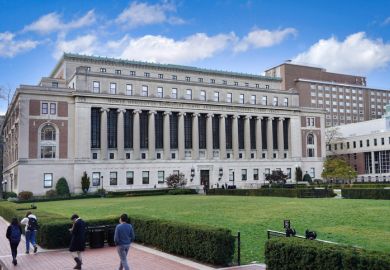One of the world’s most influential voices on higher education policy has said tuition fees should be cut after coronavirus lockdowns removed the key reason students attend university – to meet top academics, mingle with interesting fellow students and to have a “great experience”.
Andreas Schleicher, director for education and skills at the Organisation for Economic Cooperation and Development (OECD), said that restrictions on physical contact threatened the entire rationale for university education, leaving institutions vulnerable to competition from IT firms that could offer better online learning.
“If universities stay closed down for the next academic year, I think that will raise very serious questions over the value proposition they offer,” he told Times Higher Education.
Students attend prestigious – and expensive – universities to “meet the most amazing professors in the world” and “brilliant students from all over the world”.
“If that gets lost, what will remain?” he asked. The unique value of university for students was “the conversations that you had, not those courses that you take”, he added.
High-fee universities, such as those in the US and UK, are facing a collapse in international student numbers, potential mass deferments from domestic students and calls for refunds as they struggle to return to normal social and academic campus life.
“From a student perspective, £9,000 is certainly not the value of an online course,” he said, referring to the annual cost of English universities.
In light of this, he said, it would be “reasonable for governments to increase their investment in higher education” given that the return for taxpayers remained “strong”.
He stressed that he was not advocating zero fees, however: “I do think that cost sharing will have to change. There’s a strong case for lower fees and more government contribution.”
Mr Schleicher was one of the most prominent voices to give qualified support to the UK government’s decision to hike tuition fees to £9,000 in 2012, and OECD backing was cited by the government to bolster its case for the change.
He also warned universities that because the move online had removed universities’ key selling point – physical contact and experience – they were now at risk of being overtaken by other players.
Unless private universities, in particular, could “solve” the “problem” of physical distancing, “I think we’re going to see a big problem”, he said.
Following the lockdown, “some of the online learning universities provided was questionable” and “not so convincing”, he said.
“If the model is the delivery of online content, then you will have big IT companies taking charge of the sector,” he argued.
Other than an on-campus experience, universities do still offer value to students in the form of credentials they can show to employers, he acknowledged. “But I think that’s going to erode anyway – and [it will do so] faster when employers realise there are alternatives,” Mr Schleicher added.
He also expressed surprise at how cautiously universities were reopening their campuses. “Social distancing is easier for universities than a primary school,” he said. “If you open restaurants and cinemas, but not universities, I can’t see the logic.”
POSTSCRIPT:
Print headline: OECD education head: cut fees to maintain value
Register to continue
Why register?
- Registration is free and only takes a moment
- Once registered, you can read 3 articles a month
- Sign up for our newsletter
Subscribe
Or subscribe for unlimited access to:
- Unlimited access to news, views, insights & reviews
- Digital editions
- Digital access to THE’s university and college rankings analysis
Already registered or a current subscriber? Login







